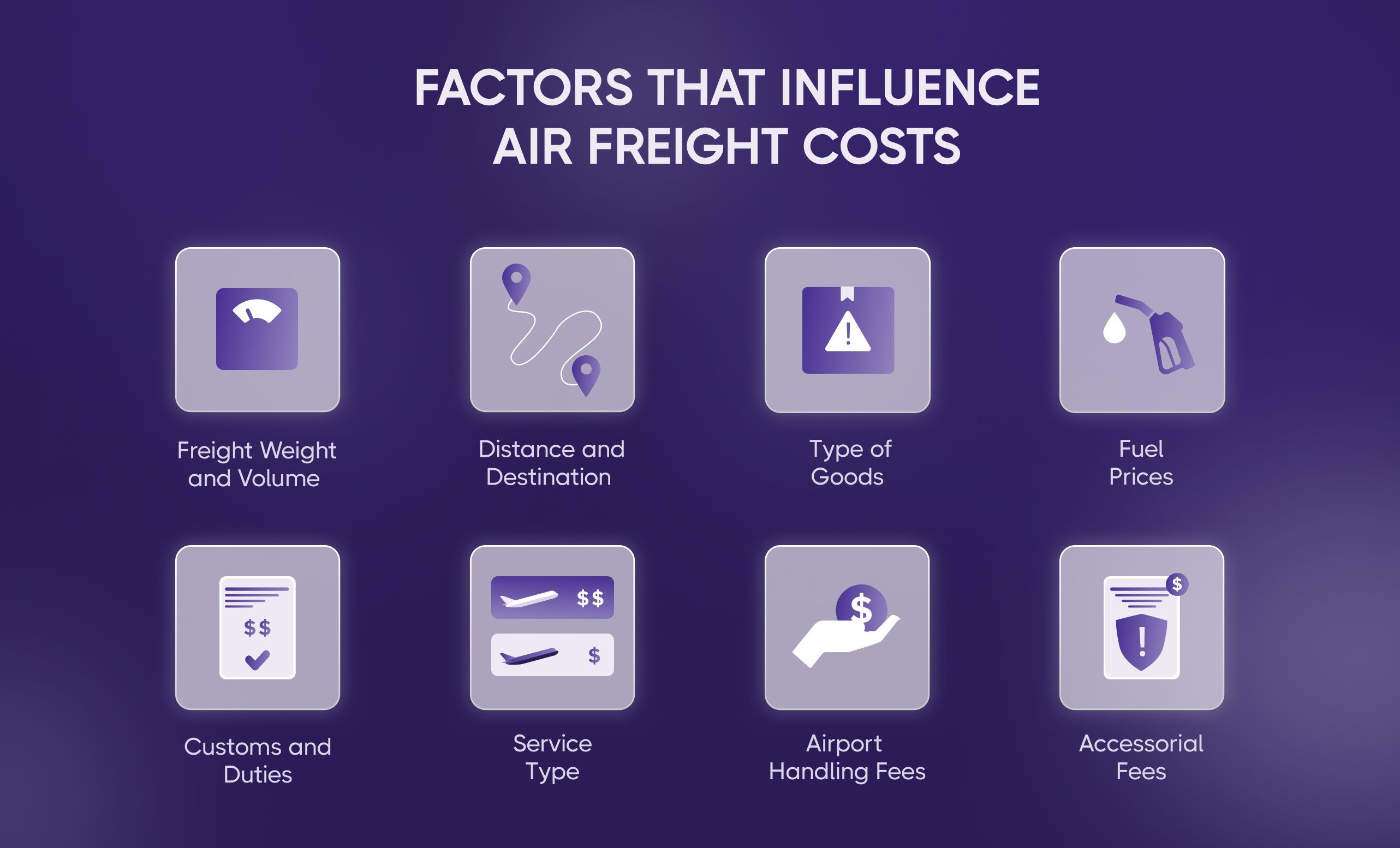
Sahiba Cuccria
8 mins read
4 mins read

Rizwan Datoo is a logistics and fulfillment consultant at eShipper specializing in D2C and B2B shipping solutions. He supports startups and established brands by simplifying complex shipping challenges and building efficient, reliable supply chains.
When it comes to global trade, air freight is the fastest way to transport goods across borders. But speed comes at a cost. Whether you're shipping express air freight for urgent deliveries or using international air freight for standard shipments, understanding the factors influencing air freight costs is essential for effective budgeting. From freight weight cost calculations to airport handling fees, a variety of elements impact the final price. In this guide, we’ll break down the key factors affecting air freight pricing, how to calculate air freight charges, and the pros and cons of choosing air transport over other shipping methods.

Several variables determine your air freight shipping cost. Here are the most critical ones:
1. Freight Weight and Volume
Air freight rates are based on the chargeable weight, which is calculated as the greater of actual weight or volumetric weight. Larger and heavier shipments cost more.
2. Distance and Destination
Shipping to major hubs with high cargo traffic is cheaper than sending goods to remote airports. Airport transfer fees and last-mile logistics also impact the final shipping price.
3. Type of Goods
Fragile, perishable, or hazardous items often require special handling, leading to higher air freight charges. Some items may require temperature-controlled storage, adding to costs.
4. Fuel Prices
Fluctuating fuel prices directly impact air freight costs, as airlines adjust fuel surcharges accordingly.
5. Customs and Duties
Import taxes, customs clearance fees, and local tariffs vary by country, influencing the total shipping freight costs.
6. Service Type
Express air freight services cost more due to priority handling, while economy options offer lower rates but longer transit times.
7. Airport Handling Fees
Costs for loading, unloading, storage, and security screening at airports contribute to airport handling fees, which vary depending on the airport’s infrastructure and policies.
8. Accessorial Fees
Additional charges, such as cargo insurance, documentation fees, and storage charges, may apply based on the nature of the shipment and any extra services required.
To estimate your air freight shipping cost, use an air freight cost calculator or follow this formula:
Chargeable Weight = Max (Actual Weight, Volumetric Weight)
Volumetric Weight (kg) = (Length x Width x Height in cm) / 6000
Final price is calculated based on the airline’s rate per kilogram and additional accessorial fees.
Pricing and Cost Breakdown
The cost of international air freight varies based on the factors mentioned earlier. However, as a general guide:
Benefits of Air Freight
Cons of Air Freight
Conclusion
Air freight offers unmatched speed and security, making it the go-to choice for urgent and high-value shipments. By understanding freight weight calculations, airport transfer fees, and accessorial charges, businesses can make informed decisions to optimize their shipping budgets. While air shipping comes at a premium, its efficiency and reliability often outweigh the costs—especially for time-sensitive goods.
Looking to streamline your air freight logistics? eShipper can help you find the most cost-effective and reliable shipping solutions for your needs. Contact us today to get started!
The cost varies based on weight, distance, and service type. Rates generally range from $3 to $10 per kg, with additional handling and customs fees.
Sea freight is significantly cheaper but slower. Air freight is ideal for urgent shipments, while sea freight is suitable for bulk goods with flexible delivery timelines.
High-value, perishable, or time-sensitive goods such as pharmaceuticals, electronics, luxury fashion, and medical equipment are commonly shipped via air cargo.
Chargeable weight is the greater of actual weight or volumetric weight and determines the air freight charges.
Freight rates depend on weight, volume, distance, fuel costs, customs duties, and accessorial fees. The final price is calculated based on the airline’s per kg rate and additional surcharges. For a quick estimate, use an air freight cost estimator or a shipping cost calculator to compare rates from different carriers.